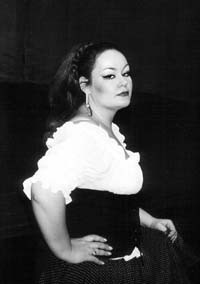The lives of classical music performers are not as well known to the general public as variety performers. The former often shy away from the media hype, correctly assuming that true art doesn’t need all that hustle and bustle, especially shocking publicity. They keep working and polishing their skills, this being far more important to them than making headlines. Merited Artiste of Ukraine Maria Lypynska, a soloist with the National House of Organ and Chamber Music, is one of them.
This young singer is quiet and reserved, with a refined musical taste, an excellent voice, and a remarkable stage presence, factors that must have determined her choice of chamber music.
“It seems I’ve been singing my entire life, first in the bathroom, then in front of the mirror, later for my parents’ guests,” says Maria Lypynska, “and I enjoyed listening to LPs with stories set to music, like The Bremen Town Musicians, Mowgli, and Buratino. I learned all the parts by heart, imagining myself singing them on stage. And Muslim Magomaev was my favorite singer at the time.
“When I was six years old, I began singing with the Shchedryk Choir, directed by Iryna Sablina. That experience was very useful because it developed my musical ear and tastes. The choir performed many classical pieces. When it came time to choose a profession, I decided to become an actress. Then I thought it over and chose music. I told myself that music would be a better opportunity to reveal my potential, although I succeeded in enrolling in the National Music Academy only on the third try. So I had to work as a correspondence secretary after school. My NMA professor was the operatic star Halyna Tuftina.”
WALKING ON A RAZOR’S EDGE
“For my graduation exam I sang Carmen. The relationship between her and Jose mirrors the conflict between society and the individual. The main idea of the opera is individual freedom. Carmen doesn’t clutch at her love and doesn’t let it dominate her life once she realizes that it isn’t as strong as it used to be. I think that deep inside many people would want to walk on the razor’s edge the way Carmen did. This is what makes her image so compelling. Some members of the audience like to let their hair down, even if inwardly. Does any of this appeal to me? I think so. It’s hard for me to do something I don’t want to. It’s always been that way. At one time I tried to force myself to become like everyone else. It didn’t work. Whenever I try to make myself toe the line, I feel a great deal of discomfort.
“I’ve been a soloist with the House of Organ and Chamber Music since 1996, but I often perform on other stages. I’m very fond of St. Andrew’s Church, where I’ve appeared in solo concerts and duets with Liudmyla Harmash. I like its atmosphere: it’s more chamber-like than the Organ Hall. Last season I sang Maddalena in Verdi’s Rigoletto at the Young Opera, then Marta in Gounod’s Faust. I also perform at the National Philharmonic Society. Now I’m preparing parts from the Mahler Symphonies.
“When I was deciding between chamber music and opera, I was influenced by my success at the Yantarny Solovey (Amber Nightingale) Chamber Vocal Contest in Kaliningrad (Russia) where I won second prize. For the time being, I’m satisfied with my work at the Organ Hall, but whenever I have an opportunity to slightly change my creative profile, I don’t pass it up.”
LUCKY AND UNLUCKY COSTUMES
“I have various repertoires at the Organ Hall. Recently I recorded a CD featuring old Russian romances. Every piece is a short story, like “I’ve Fallen in Love,” “Insane, I’m Still in Love.” People listen to them with rapt attention, some even cry. Classical music must be promoted. I’m sure that it has its own audience.
“Different programs require different costumes that are custom- made for me. I like the “small fish” style, with the top part clinging to the figure and the bottom flaring out. I don’t like crinolines, although that’s a more festive style. Conservative black dresses are for modern music; sometimes they’re complemented by a touch of color, like a flower, brooch, or bow. Conservative attire also suits the world classics. I have lucky and unlucky costumes. The unlucky ones are collecting dust in the closet and it’s hard for me to part with the lucky ones.
“I’ve never regretted becoming a performer and singer, however hard it’s been at times. Work practically takes over your life, so how can you live if you hate your work? At one time I had to convince my family that I had made my choice and would be a singer. They were against it, but then they agreed and they’re helping me by looking after my seven-year-old son Dmytro. He is a lively, inquisitive little boy, fond of sports, especially judo. I’m not pushing him toward music. Instead, I’m raising him to be a listener. So far I can’t say that he’s developed a liking for serious music, but my son is very proud that his mom is a singer.”







